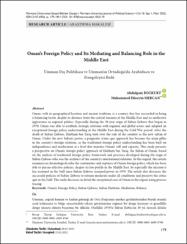Oman’s foreign policy and Its mediating and balancing role in the Middle East
Künye
Bozkurt, A. & Mercan, M.H. (2022). Oman’s Foreign Policy and Its Mediating and Balancing Role in the Middle East. Marmara Üniversitesi Siyasal Bilimler Dergisi, 10(1), 179-190. https://doi.org/10.14782/marmarasbd.1055119Özet
Oman, with its geographical location and ancient tradition, is a country that has succeeded in being
a balancing factor, despite its distance from the central tensions of the Middle East and its ineffective
appearance in regional politics. Especially during the 50-year reign of Sultan Qaboos that began in
1970, Oman was able to establish strategic relations with regional and global actors and adopted an
exceptional foreign policy understanding in the Middle East during the Cold War period. After the
death of Sultan Qaboos, Haitham bin Tariq took over the rule of the country as the new sultan of
Oman. Under the new Sultan’s power, a pragmatic status quo approach has become the main pillar
in the country’s foreign relations, as the traditional foreign policy understanding has been built on
independence and moderation at a level that matches Oman’s will and capacity. This study presents
a perspective on Oman’s foreign policy approach of Haitham bin Tariq, the Sultan of Oman, based
on the analysis of traditional foreign policy framework and practices developed during the reign of
Sultan Qaboos who was the architect of the country’s international relations. In this regard, this article
examines in chronological order the continuities and ruptures of Omani foreign policy, which has been
able to pursue effective policies, despite its low profile in the Middle East, by especially the mission it
has assumed in the Gulf since Sultan Qaboos assumed power in 1970. The article also discusses the
successful policies of Sultan Qaboos to remain moderate under all conditions and preserve the status
quo in the Gulf. The study discusses in detail the exceptional case of Oman in the region using process
tracing Umman, coğrafi konum ve kadim geleneği ile Orta Doğu’nun merkez gerilimlerinden büyük oranda
uzak kalmasına ve bölge siyasetindeki etkisiz görünümüne rağmen bir denge kurmayı ve genellikle
denge unsuru olmayı başarmış bir ülkedir. Özellikle 1970’te Sultan Kabus’un 50 yıl sürecek iktidar döneminde önemli açılımlar gerçekleştirerek, bölgesel ve küresel aktörlerle stratejik ilişkiler tesis
edebilmiş ve Soğuk Savaş dönemi Orta Doğu’sunda istisnai bir dış politika anlayışı benimsemiştir.
Sultan Kabus’un ölümünün ardından ise yerine Heysem bin Tarık gelerek ülkenin yeni yöneticisi
oldu. Yeni Sultan’ın yönetimi altında, geleneksel dış politika anlayışı Umman’ın irade ve kapasitesiyle
örtüşecek düzeyde bağımsızlık ve ılımlılık üzerine bina edilerek pragmatik bir statükocu yaklaşım
ülkenin uluslararası ilişkilerinde ana sütun haline dönüştü. Bu çalışma Umman’ın yeni sultanı Heysem
bin Tarık’ın dış politika yaklaşımına dair ülkenin uluslararası ilişkilerinin mimarı Sultan Kabus’un dış
politika çerçevesi ve pratiklerine atıfla bir perspektif sunmaktadır. Bu bağlamda, makale Sultan Kabus’un
1970’te iktidara gelişinden günümüze kadar Umman dış politikasındaki süreklilikleri ve kırılmaları
kronolojik bir zeminde ele almakta ve ülkenin Orta Doğu siyasetindeki zayıf görünümüne rağmen
nasıl etkin politikalar izleyebildiğini açıklamaya çalışmaktadır. Makalede ayrıca Sultan Kabus’un
Körfez’deki statükonun korunması ve Umman’ın her koşulda ılımlı bir aktör olarak kalmasında izlediği
başarılı siyaset tartışılacaktır. Çalışmada Umman’ın bölgedeki istisnai örnekliği süreç takibi yöntemiyle
detaylı bir şekilde incelenecektir


















